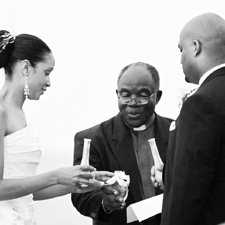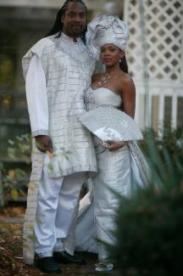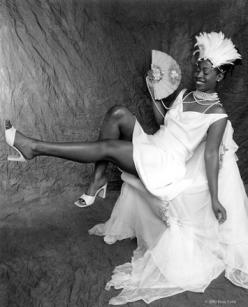Knocking on the Door Since marriage in African culture is considered the official joining of two families, a large emphasis is placed on getting family permissions and blessings before the wedding. In Ghana, the groom requests permission through the custom of "knocking on the door." Bearing gifts, he visits his potential in-laws accompanied by his own family. If his "knock" is accepted, the families celebrate and the wedding planning begins. Or, simply plan an outing (like a brunch or dinner date) to bring both families together before the wedding and begin forming family bonds.
Jumping the Broom This tradition most likely originated with an African ritual in which a broom is used to demonstrate that all past problems have been swept away. During slave days, African-Americans were forbidden to marry and live together, so jumping over a broom was a formal and public declaration of the couple's commitment. Today, it has become very popular for African-American couples to follow suit at the conclusion of their wedding ceremony. The broom, often handmade and beautifully decorated, can be displayed in the couple's home after the wedding. Check with local cultural institutions for broom makers and suppliers. READ MORE...
Crossing Sticks In a lesser-known tradition. African-American couples demonstrated their commitment by crossing tall wooden sticks. By crossing the sticks, which represent the power and life force within trees, the couple expresses a wish for a strong and grounded beginning. If you decide to incorporate this tradition, choose large branches from both of your families' homes or from a place meaningful to you as a couple.
Libation Ceremony (Tambiko)
Many African-American couples incorporate a libation ceremony into their weddings as a way to honor their African ancestors. Holy water, or alcohol, is poured onto the ground in each of the cardinal directions as prayers are recited to the ancestral spirits, and names of those that have recently passed are called out. The libation ceremony can also be used as an opportunity to honor the elders in a family, asking them to pass on their wisdom and guidance. READ MORE...
Tying the Knot
In some African tribes, the bride and groom have their wrists tied together with cloth or braided grass to represent their marriage. To symbolize your own unity, have your officiant or a close friend tie your wrists together with a piece of kente cloth or a strand of cowrie shells (symbols of fertility and prosperity), while affirming your commitment.
Tasting the Four Elements
In a ritual adapted from a Yoruba tradition, the bride and groom taste four flavors that represent different emotions within a relationship. The four flavors typically used are sour (lemon), bitter (vinegar), hot (cayenne), and sweet (honey). By tasting each of the flavors, the couple symbolically demonstrates that they will be able to get through the hard times in life, and, in the end, enjoy the sweetness of marriage.
Kola Nuts
Kola nuts play an important role in African weddings. The nut, which is used for medicinal purposes in Africa, represents the couple's (and their families') willingness to always help heal each other. In Nigeria, the ceremony is not complete until a kola nut is shared between the couple and their parents. Among African Muslims, the nut is also a symbol of fertility and is exchanged with family members during the engagement celebration. Many African-American couples incorporate the sharing of a kola nut into their ceremonies and then keep the nut in their home afterward as a reminder to always work at healing any problems they encounter.
Resource information provided upon request
Wedding Attire
is a very important part of the African wedding traditions. The following are just some of the traditional garb that Africans use on their wedding day. Again, depending on where you are and what your beliefs are, you can either use them if they're available to you or draw upon them as an inspiration to create your own unique design.
Bride and groom may choose handwoven African royal fabrics, called Kente to wear for the ceremony making them King and Queen for a day. The traditional color of African royalty is purple accented with gold. These may also be used as accent colors for the bridal ensemble.
Kente Cloth
is a primary woven fabric produced by the people of the old Ashanti Kingdom of Ghana. It has traditional red, gold and green repeated in the design which symbolizes liberation i.e. red, for the blood shed by millions in captivity; gold, for the mineral wealth or prosperity; and green, for vegetation.
The African bride wears a Wrap Skirt (iro) made of kente cloth, a matching ·Shawl (iborum) and Headpiece (a gele’), and a Short, loose blouse (buba) made out of the same fabric as the skirt.
|
Defining the African American Wedding
When a bride in the United States desires an "African-style wedding," she is usually referring to Yoruba traditions. The Yoruba style wedding is a very spiritual service which reflects the depth of the African family by the sharing of gifts and love.
The ceremony process may begin about a month before the wedding with spiritual readings. Elements of the actual ceremony may include a Libation (a prayer with an offering, usually water or liquor offered by an elder). This ritual calls upon and asks God's blessing and the blessings of ancestral spirits. The groom verbally seeks permission from the bride's mother to marry her daughter.
Gifts are presented to the brides family symbolizing the ability of the groom to take care of this woman. They are accepted by the bride's father. Other elements of the ceremony may include a tasting and explanation of spices, prayers, exchange of rings. A great celebration follows.
Taditional Native Dress
Traditional native dress for the women would be a headpiece (a gele'), a loose fitting or grand bou-bou or the wrap skirt (iro), shawl (iborum), and a short loose blouse (buba) made out of the same fabric. The groom wears a pair of slacks (sokoto), shirt (bubba), a long flowing jacket (agbada) and a rounded box-like hat (fila).
African American couples who chose a more American flare may choose the traditional white bridal gown for the bride and the groom a tuxedo. Both may be trimmed in Kente cloth. The traditional color of African royalty is purple, accented with gold. These may be used as accent colors worn by the bridal party.
Article Written By
Rosetta Bartlett-George
|
|
 |
|
|  |
|
 |
Ethnic Attire has Evolved....
The biggest way to make an Afrocentric impact... UPSCALE men and women are making a bold statement with Afrocentric attire and accessories. Attend a festive gala in New York, Los Angeles or Chicago, or anywhere in between, and you will see Black professionals decked out in ensembles inspired by Mother Africa alongside those wearing ball gowns and tuxedos. From dinners at the White House and Kennedy Center events to the huge banquet that highlights the annual Congressional Black Caucus to the annual Black Creativity Gala that kicks off Black History Month in Chicago, one can witness handsome Black men and gorgeous Black women adorned in African attire.
Women are dressed in African-inspired gowns while others prefer an Afrocentric accent, such as a colorful scarf or shawl of kente cloth or mud cloth, or dazzling African jewelry. Among celebrity women who attend social gatherings in ethnic attire are Erykah Badu, Lauryn Hill, Judith Jamison, Sheryl Lee Ralph and Marian Wright Edelman of the Children's Defense Fund. A number of well-known men, such as Andrew Young, Dick Gregory and Marion Barry, are known for their Afrocentric evening attire. They may wear a bow tie, cummerbund or vest of kente cloth, or their tux may be embellished with a kente cloth lapel or other accent. For many years Stevie Wonder, Isaac Hayes and actor Garrett Morris have donned African robes, and more recently younger male entertainers have adopted the style, including The Artist, Wyclef Jean and Speech.
Afrocentric Attire Continued...
|
|
|
 |
|











